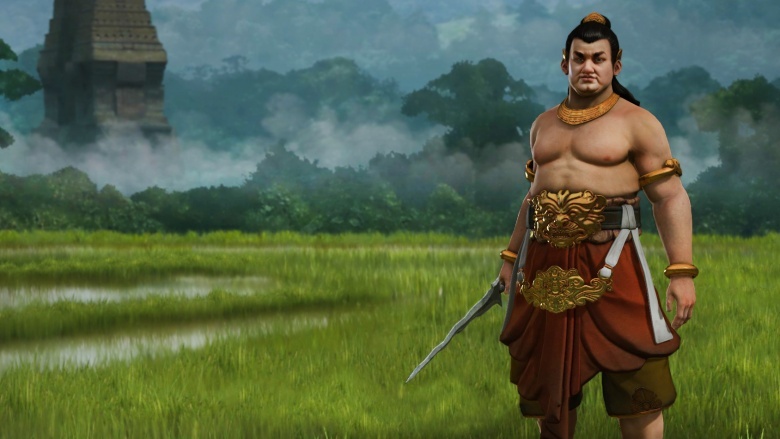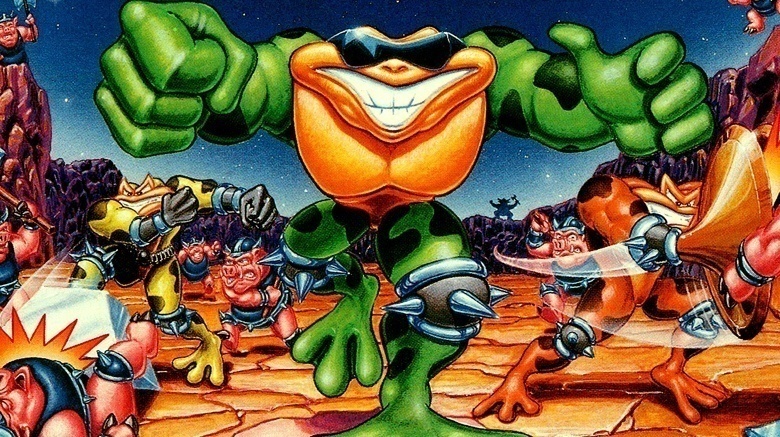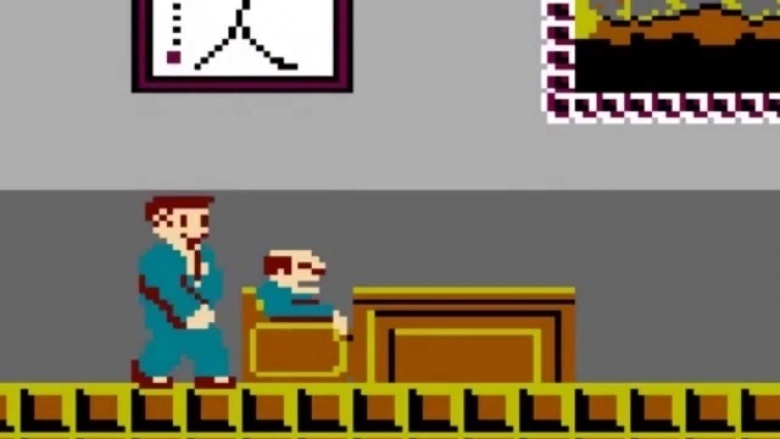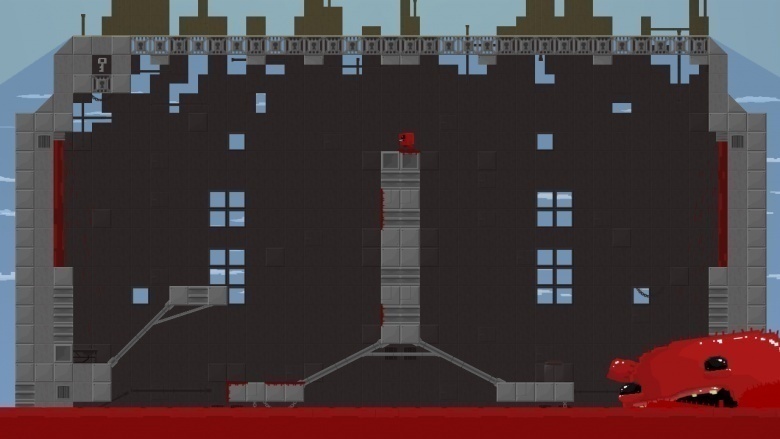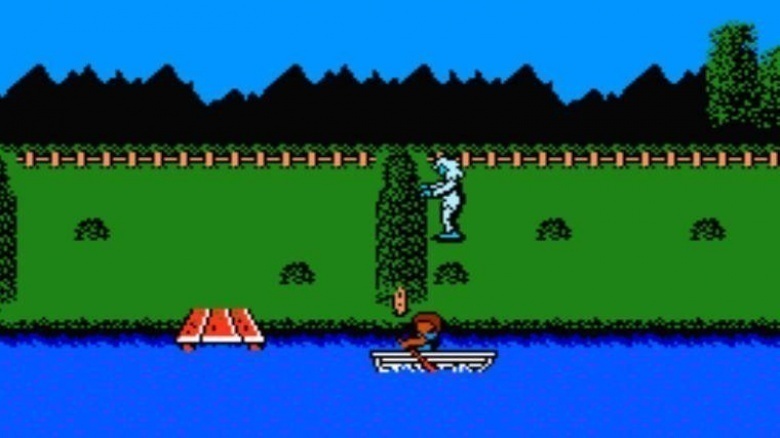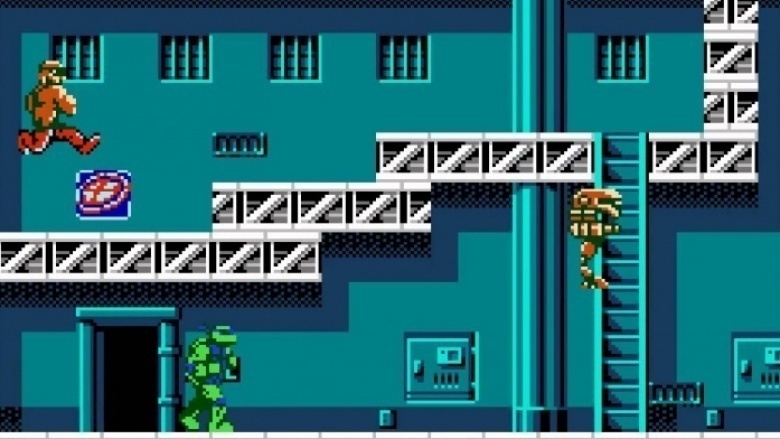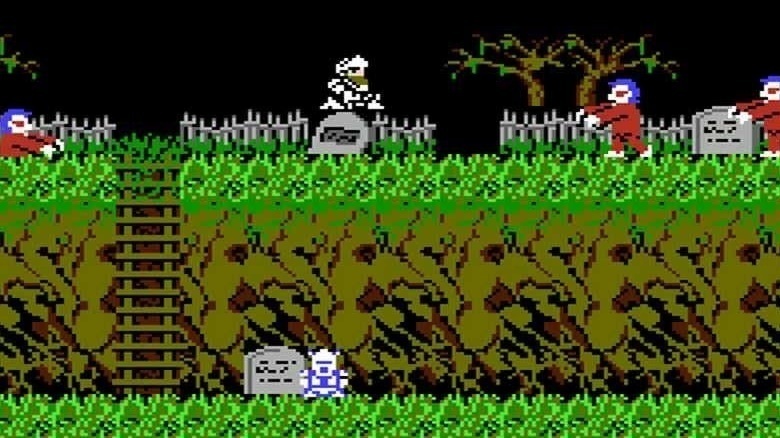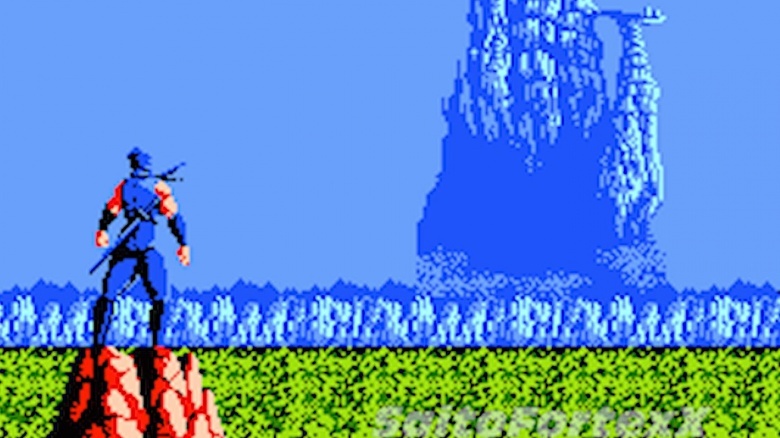Games Few People Have Beaten
Sid Meier's Civilization V is a very expansive game with multiple campaigns, including one featuring Gajah Mada from Indonesia. As a character, his focus is on faith, so he tries to spread religion while also trying to build up a strong naval fleet. For whatever reason, players don't seem to dig this, because as of this writing, only 1.5% of all Civilization 5 players on Steam have completed the game as Gajah Mada. They must not be feeling the Java.
Some video games are fun from start to finish. Others seem to leave out the "finish" part and remain unbeaten forever. Here's a selection of games that, for whatever reason, haven't been beaten by very many people. Maybe you'd like to try?
Battletoads
Battletoads' difficulty is the stuff of myths, with many claiming to have beaten it without having any actual proof. The adventures of Rash, Zitz, and Pimple were even more of a challenge because you had to battle both the streams of bad guys and the game mechanic that allowed you to punch your own teammate. It was completely possible to keep dying because of friendly attacks. Harsh.
Takeshi's Challenge
Takashi no Chousenjou, otherwise known as Takeshi's Challenge, gave fits to Japanese NES fans. The "Takeshi" in question was actor/director Takeshi Kitano, a man who holds the distinction of being one of the first celebrities to get involved with the world of gaming. Sadly, his efforts produced a title widely considered one of the worst games of all time. Why all the scorn? Takeshi's Challenge is nearly unbeatable, owing to gameplay that largely depends on trial and error. There's even one section that requires the use of the second controller's microphone to sing some karaoke. What? While the game could be beaten by slogging through the confusing gameplay, you could have also thrown 30,720 punches on the opening screen to get to the ending. Say goodbye to your thumbs.
Super Meat Boy
Released in 2010, Super Meat Boy was created as an intentional throwback to the crazy-hard games of our youth. And if you ask anyone who's played it, it definitely delivers on that promise. There are tons of videos on YouTube that show players dying over, and over, and over again. Needless to say, Super Meat Boy is one of the hardest games released in recent memory, and fans love it for that very reason. In fact, according to Steam's Global Gameplay stats for the PC version, a measly two percent of players have achieved 100 percent completion on it. Maybe they should rename this game "Super Incomplete Boy."
Friday the 13th
As we mentioned, Super Meat Boy is an homage to the tight, challenging games of yesteryear. But for every Metroid or Super Mario Bros., there are lots of other old games that were hard not because they were good, but because they were bad. Very, very bad. Case in point: Friday the 13th for the original Nintendo Entertainment System. In 2009, Game Informer magazine included this on its list of the worst horror video games. Other magazines, like GamePro and Nintendo Power, have gone a step further by calling Friday the 13th one of the worst games ever made, period. Friday the 13th is very nearly impossible to beat...but mostly because it's so crappy that most players would simply throw their controllers through the TV before getting anywhere close to completing it. That still counts, right?
Teenage Mutant Ninja Turtles
Konami's Teenage Mutant Ninja Turtles game deserves a special place on our list. Despite the fact that it gave players bald spots from tearing their hair out in frustration, it was actually very popular at the time—and because of titles like this, we can fondly look back at a time when games not only challenged us, but also extinguished our hope of finishing them. Call it a sneak peek at the harsh realities of adult life.
Do Not Believe His Lies
Do Not Believe His Lies is a bit strange because it's a mobile game that's played kind of cooperatively. It was released in 2014 by theM Dev on Android and iOS, and since then, it's caused many sleepless nights. Each part of the game features cryptic puzzles and riddles that create a story when solved, but it's incredibly hard, and plenty of players have dropped out along the way. Luckily for those who remain, a Reddit community was created to crowdsource solutions.
Ghosts ‘N Goblins
If you've ever been bathed in the fires of the Nintendo Entertainment System, chances are you've experienced the test of wills known as Ghosts 'N Goblins. Arthur had to launch his lances and use other tools to fight through hordes of demons and the undead to save Princess Prin Prin from Satan, which was no easy feat. To make matters worse, the game didn't allow you to save your progress, nor did it have passwords to help skip you to a stage, making Ghosts 'N Goblins one of the hardest games ever made. The worst part is that players must acquire the cross weapon and beat the game twice over, on a higher difficulty setting, to get to the real battle with Satan. The brutality is quite real.
Radiant Silvergun
Many hardcore video gamers consider Radiant Silvergun for the Sega Saturn to be one of the best shoot'-em-ups of all time. At first glance, the game doesn't appear to be significantly different from its brethren: it's a 2D vertical shooter in which you pilot a spaceship and destroy enemies set to a suitably epic soundtrack. What about this premise warrants a $200 asking price on eBay?
What makes Radiant Silvergun stand out is its gameplay mechanics. Unlike most shooters, you don't collect new weapons through the course of the game. Instead you have access to all seven of your ship's armaments—including a sword—from the beginning. Who knew wielding a blade could be so effective in dispatching rival spaceships? Luke should have strapped his lightsaber to his X-Wing. It's not enough to be skilled at dodging enemies' attacks, either: to truly succeed in Radiant Silvergun, you need to know when to use each weapon at the proper time. This means you must either possess split-second reflexes or memorize every level. Sure, if you play the arcade version then you can just spend $20 to finish the game, but where's the skill in that?
For the longest time, the most difficult aspect of Radiant Silvergun was purchasing a copy without forgoing food that month. Its developer, Treasure, only released it for the Saturn in Japan. This thankfully changed in 2011, when the game came to Xbox Live with enhanced visuals.
Ikaruga
Fans often refer to Ikaruga as a spiritual sequel to Radiant Silvergun. It certainly retains the core elements of its predecessor: both games are vertical sci-fi shoot-'em-ups, developed by Treasure, that rely on frenetic, difficult gameplay. The major difference, aside from Ikaruga's superior visual presentation, is each game's mechanics.
Ikaruga is arguably the simpler game of the two. Enemies shoot either light or dark colored lasers at your ship; on the fly, you can switch your ship's force field to light or dark to match and absorb the corresponding enemy fire. If you absorb enough, then you can unleash a powerful laser attack. The simplicity of the gameplay belies the fact that this game itself is hard. You'll need machine-like reflexes to dodge copious amounts of enemy fire and rapidly switch forcefields back and forth.
Becoming a paragon of patience is necessary to get anywhere in Ikaruga. If all else fails, you can just watch someone demonstrate their expert run on YouTube and feel deep-seated resentment and/or jealousy. Fortunately, Ikaruga is a bit more accessible than Radiant Silvergun. The original arcade game has been released on Xbox Live, the Dreamcast (import only), the GameCube, and Windows.
Ninja Gaiden
Ninja Gaiden likely resulted in extra profits for Nintendo, since players had to replace their NES controllers after throwing them against the wall in frustration. Nearly all the games in the Ninja Gaiden series are known for their difficulty, including the NES trilogy and the more recent Xbox and Playstation reboots. The first game on the NES, however, is arguably the most memorable.
Players control a ninja named Ryu Hayabusa on his quest to defeat evil. Like many side-scrolling action platformers of the 1980s (e.g. Castlevania) Ryu gets knocked back several feet whenever he takes a hit. This means that 90 percent of the time, you'll die from getting hit and falling off a cliff. This wouldn't be a huge problem by itself, but it seems that every creature big and small has it out for Ryu's blood: rival ninjas, soldiers, dogs, and even hawks all want Ryu dead. The amount of enemies on screen can be obscene. Oh yes, and these baddies also respawn. To top this all off, if you manage to make it to the end of the game, you must face three bosses in a row without dying. Becoming a ninja in real life and taking out actual criminals may be easier than finishing Ninja Gaiden.
F-Zero GX
Many fans argue that F-Zero GX for the GameCube is the best entry in the futuristic racing series. The game boasts impressive graphics for the system, extremely fast gameplay, a rocking soundtrack, and epic science fiction-inspired racetracks. Oh yeah, and it's also tough as nails. The game demands track memorization and flawless driving to succeed. The races move so fast that unless you know what's coming around the corner, your vehicle will likely fly off the track and explode. Suffice it to say, if you can complete 100 percent of what F-Zero GX has to offer, then you are a video game god. Sadly, Nintendo only followed up this minor classic with two F-Zero entries on the Game Boy Advance. We hope the Big N finally gives F-Zero GX a worthy sequel on its next console.
Threes
You can't beat Tetris. You can't beat Bejeweled. So why would anyone assume that you can beat Threes? Games like Sirvo's tile-based timewaster are usually about racking up high scores, not reaching an ending. For most puzzle games, bragging rights are the only reward you need.
And yet, as the minds behind the Threes Porn Twitter account discovered, Threes does end. It just takes a long time to get there. In Threes, players start with pieces worth one and two points. By swiping the screen, they can merge the tiles, making pieces that are worth three points, then six, then twelve, and so on. Creating the biggest tile in the game, which is worth 6,144 points, takes a long time. Making two and fusing them together takes even longer, and requires quite a bit of patience, a careful strategy, and a whole lot of luck.
In fact, reaching the conclusion of Threes is so difficult that its developers didn't originally put an ending in the game, figuring that nobody would ever actually get there. They were wrong. Three and a third years after Threes made its debut debut (yes, seriously) someone finally discovered the game's hidden ending, quite possibly becoming the first person to do so — at least without cheating.
NieR: Automata
It only takes about 15 hours to finish NieR: Automata's main campaign, but that's hardly the end of the game. In fact, the first time that you see the credits, you're only about a third of the way through PlatinumGames' post-apocalyptic android adventure. If you want to truly beat the game, you'll need to start a new game and work through the base campaign for a second time, observing events from 9S's — and not 2B's — point of view. Then, you'll have to begin a third playthrough, which unlocks the second half of the story and introduces 2A, a playable character that only briefly appears in the game's opening section.
You're still not done. After your third go-around, you'll unlock a level-select screen, which you can use to select the other option during the game's climactic boss fight (no spoilers — you'll know what we mean when you get there). That'll unlock the fourth ending, but you're not done quite yet. As the credits roll, the game transforms into a nigh-impossible bullet-hell shooter. Finish that — and no matter how many times the game asks, don't give up — and you'll finally get the real ending.
Many games have New Game Plus modes, and most players won't realize that they need to play the game multiple times to get the full story. It's not hard to get the final ending, but it's not easy to find without help. That's by design.
"I'm the type that gets bored easily, so I lose any motivation to work if I know what the end product will be like," director Yoko Taro says. "As such, I can only create a product that constantly betrays my own imagination."
Super Hexagon
Super Hexagon couldn't look more simple. You control a small triangle caught in the middle of a hexagon, pentagon, or square. Each side of the polygon has an opening, and all you have to do is guide your piece to the exit while the shape shrinks around you. Succeed, and you'll find yourself in the middle of another hexagon. Survive for 60 seconds to unlock the next difficulty, and keep going until you've successfully outlasted each level.
That shouldn't be difficult. In practice, it's almost impossible. Maybe it's the way that the Super Hexagon levels rotate while you're rotating yourself, making it hard to keep your sense of direction straight. Maybe it's how the shapes in the middle of the screen pulse in time to the music, giving the entire experience a psychedelic vibe. Perhaps it's the way that the shapes change as they get closer to your avatar, requiring split-second reactions and sudden changes of strategy. Whatever the cause, only 3.6% of PC players have managed to last for a full minute on the Hyper Hexagonest stage and witnessed the ending. But, sure, it looks simple.
Devil Daggers
Players who cut their teeth on '90s shooters like the original Doom and Quake should feel right at home in Devil Daggers, the throwback FPS from indie developer Sorath. Like those games, Devil Daggers asks players to toss out things like stealth and strategy and go in guns (or, in this case, knives) blazing, killing everything that moves as quickly as possible. Also like those games, Devil Daggers takes no prisoners. If you fall off of the level or make contact with an enemy, that's it. Back to the beginning.
In order to master Devil Daggers, you don't have to reach the end of the level. You just have to survive against increasingly difficult waves of enemies for a total of 500 seconds. By collecting orbs dropped by downed foes, you can upgrade your weapons, but as the clock counts down those barely matter. While you play, the amount of space you have to move around in shrinks while the number of enemies grows, and in later stages it's easy to lose track of the action while dashing and double-jumping out of harm's way. As of this writing, only .1% of players have managed to last for the requisite 8.33 minutes needed to secure a victory.
Look, old games are tough, and while Devil Daggers looks old-school with its muddy textures and low-res graphics, the challenge is what really makes it old-school. For the most part, they don't make 'em like this any more — Devil Daggers being the rare exception.
Darkest Dungeon
Many role-playing games send a group of adventurers into a dungeon to search for treasures. Very few delve into the psychological trauma that results from spending an extended amount of time in the monster-filled darkness. Darkest Dungeon does. Like usual, characters can be killed by skeletons, necromancers, ghost pirates, and pig men. But they'll also get increasingly stressed as they head deeper underground, forming neurotic quirks and, in extreme cases, going full-on crazy.
Oh, and by the way, once characters are gone, they're gone for good, meaning that you'll need to train replacements, and the dungeon layouts change every time you head inside. That means that you never quite know what to expect, and given how important pre-quest preparation is to the game, you'll often find yourself in deep, deep trouble before you even really get started.
That's probably why Darkest Dungeon is so darn tough. Since its release in early 2016, less than 2% of Steam players have finished the game — and that's on the regular setting. The extra-hard "Stygian" mode only has a 0.3% completion rate. Or, to put it another way: if Darkest Dungeon's underground slog doesn't drive you mad, its near-impossible difficulty level probably will.
Persona 5
Raise your hand if you have enough time to spend 100 hours on a single-player video game. Now, keep it raised if you have the time to spend 100 hours on a single-player video game twice.
Persona 5 is a stylish, well-made game that clears the already high bar set by its predecessors, but it demands quite a bit of attention. Players with busy social lives — or anyone who wants to play some of the other stellar games that have come out over the past few years — may not ever finish winding their way through Persona 5's otherworldly dungeons or navigating its labyrinthine social scene.
That's normal. According to leading industry figures, only 20% of players actually finish the games they start, and the meatier a game is, the lower its completion percentage. You can finish Portal in a couple of hours, but only 46% of players have done so. For longer games, like the open-world western Red Dead Redemption (which is a 20 to 40 hour experience), that drops to around 10%.
Not only is Persona 5 at least twice as long as Red Dead Redemption, but it has multiple endings, too, and if you don't make the right decisions at a few crucial moments, you won't get the real ending. For die-hard fans, that's fine — it's impossible to see everything that Persona 5 has to offer on a single playthrough anyway — but for the rest of us, a single run is daunting enough. And while Atlus may not like it, looking up the canonical ending on YouTube is a heck of a lot faster.
Spelunky
Everybody loves Spelunky. The open-source original quickly became a favorite with gamers and amateur developers, who lovingly expanded the game with all kinds of fan-made modifications. The HD remaster won a number of Game of the Year awards. Spelunky's plucky little main character, also known as Spelunky, is the closest thing we have to a modern-day gaming icon, and has appeared on toy shelves, t-shirts, and even other video games.
And yet, according to Steam, only about 7% of people have beaten Spelunky. If you throw out people who took shortcuts, that number falls to just under 6%. So, what gives? Obviously, the procedurally-generated levels play a big part — no two Spelunky runs are going to be exactly the same, meaning that memorizing stage layouts won't help you like they do in Spelunky's peer, Super Meat Boy. Spelunky also forces you to move fast. Not only are the game's caverns crammed full of monsters that want you dead, but if you dawdle, an (almost) invincible ghost appears and hunts you down. Spelunky never explains what its various items do or how its devious traps work, either. You have to figure it out for yourself — usually by dying until you get the hang of it.
Spelunky is a game for masochists, but somehow, it never gets old. While 93% of players will never see the final screen, every playthrough gets you a little bit closer to the credits — and that's just enough encouragement to keep most people heading back again and again and again for one more round.
